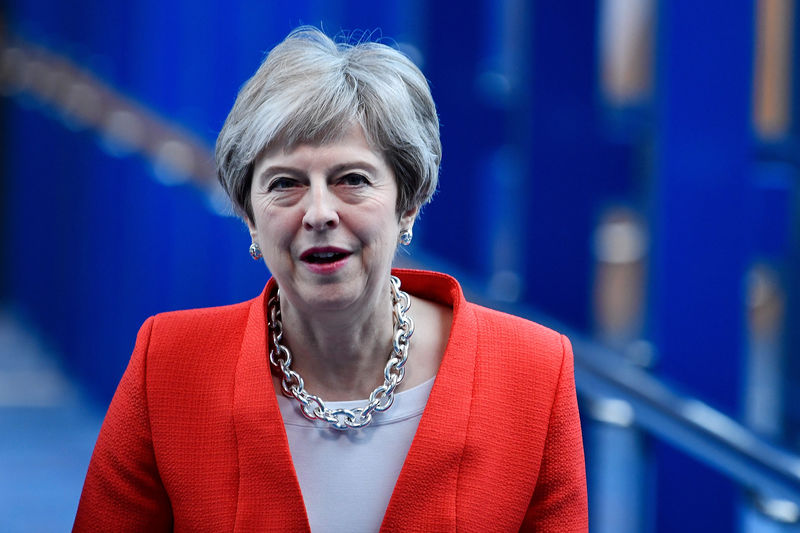(Bloomberg) -- Theresa May will head to Berlin and Paris Tuesday as part of her efforts to win a short delay to Britain’s departure from the European Union, while at home some in her party try to throw her overboard.
EU diplomats are said to be settling on the idea of offering an extension to Britain despite the lack of progress at home. It will also be tied to commitments from May that she -- and any successor -- wouldn’t try to disrupt EU business. May will continue to press her case when she meets German Chancellor Angela Merkel and French President Emmanuel Macron.
Meanwhile, in London, face-to-face talks will resume between the government and the main opposition Labour Party, after four days in which the two sides have exchanged messages without reaching an agreement. Labour leader Jeremy Corbyn said Monday evening that while the talks have been “serious,” May has “not yet moved off her red lines.”
May wants Labour to vote for her deal, which has now been rejected by Parliament three times. Labour wants a commitment that the government will seek a customs union with the EU. And like European leaders, it wants that commitment to be binding on whoever succeeds May as prime minister.
‘Hands and Knees’
The problem is that May has no political room left to compromise. Even her decision to sit down with Corbyn is too much for many Tories. Because they failed to oust her in December, their constitution forbids them from trying again for a year, but some Conservative members of Parliament want to try anyway. One, Mark Francois, on Monday demanded that Conservative MPs be given a chance to vote on May’s position Wednesday.
The government’s announcement that the U.K. is to prepare for European elections in May provoked outrage from Tories. “All over the country there is a firestorm that we might be involved in these European elections,” Conservative MP Bill Cash told Parliament. He said May’s policy was “subjugation to the European Union by crawling on our hands and knees as a government to the European Council.”
Party Leadership
Meanwhile, May’s announcement that she will step down if she can get her Brexit deal through Parliament means that the race to succeed her is already underway. That means cabinet ministers adopting positions, at least in public, that are likely to appeal to party members, who are generally very euroskeptic.
Corbyn, too, is under internal pressure. Although he is personally a lifelong opponent of EU membership, the party he leads strongly supports it. Many Labour MPs want any deal that he agrees with May to be subject to a referendum. Even if May and Corbyn could reach an agreement, the compromises might drive away many Tories without winning over sufficient Labour votes. The Telegraph reported Monday that the prime minister had privately floated the idea of allowing Tories a “free” vote on a second referendum, confident it still wouldn’t pass the Commons. May’s office declined to comment.
Parliament, meanwhile, could agree only on what it didn’t want. Late Monday it passed a law designed to prevent the government from pursing a no-deal Brexit. That sets up a vote either Tuesday or Wednesday in which MPs will try to mandate May to seek a longer extension of negotiations than she is currently asking for.
48 Hours
In Europe, the concern is around May’s successor. With some Tories demanding that the U.K. block EU meetings until it can get its way, Dutch Prime Minister Mark Rutte said Monday on Twitter that: “A positive decision hinges also on assurances from U.K. on sincere cooperation.” May promised in a letter to the EU last week asking for an extension to June 30 that the U.K. would pursue “sincere cooperation,” but some governments think that doesn’t go far enough.
Leaders from countries most affected by Brexit are planning a “coordination” meeting Wednesday afternoon in Brussels, shortly before the start of an EU summit where all 27 will make a decision on the extension after hearing from May, two officials said. The group, which will probably include the heads of Belgium, France, Germany, the Netherlands, Ireland, Denmark and Spain, will seek to forge a common position on the delay and its conditions to present to their EU counterparts, one of the officials said.
Talks between EU officials will continue over the next 48 hours in Brussels and Luxembourg, where European affairs ministers from the 27 governments meet Tuesday morning.
(Updates with Parliament passing law against no-deal in 11th paragraph.)
